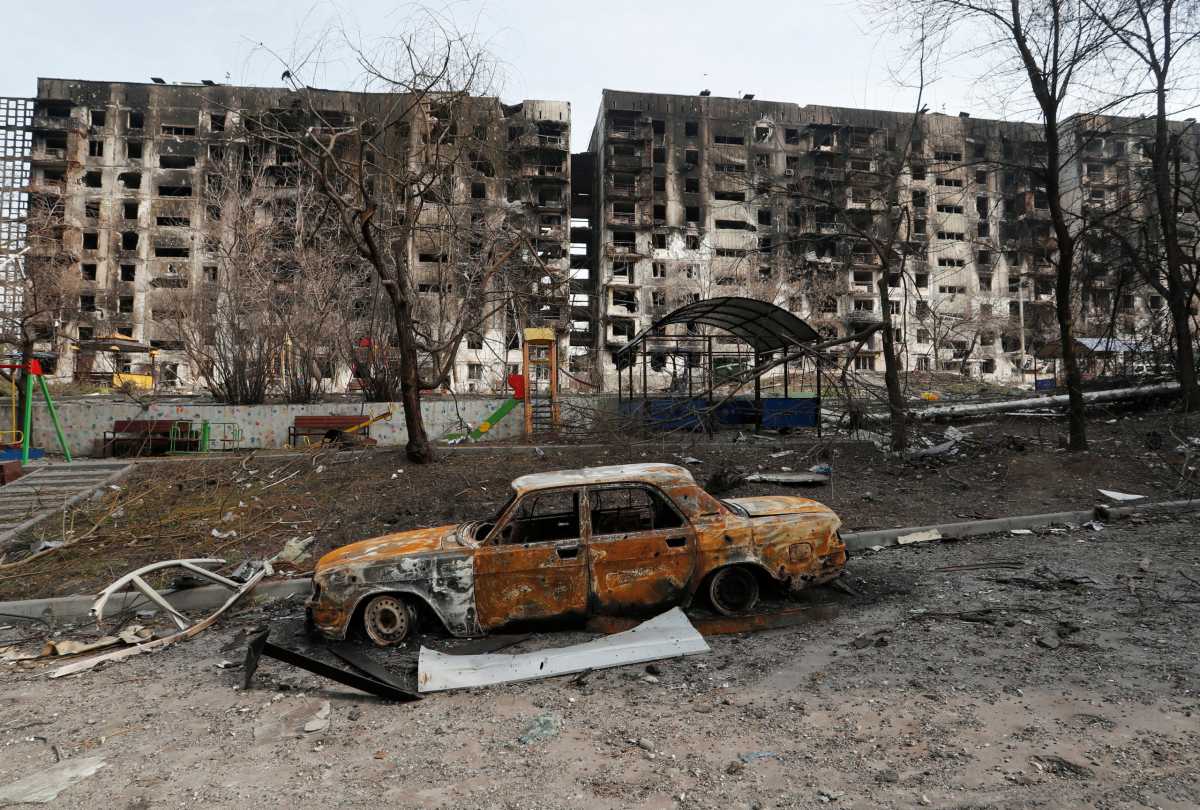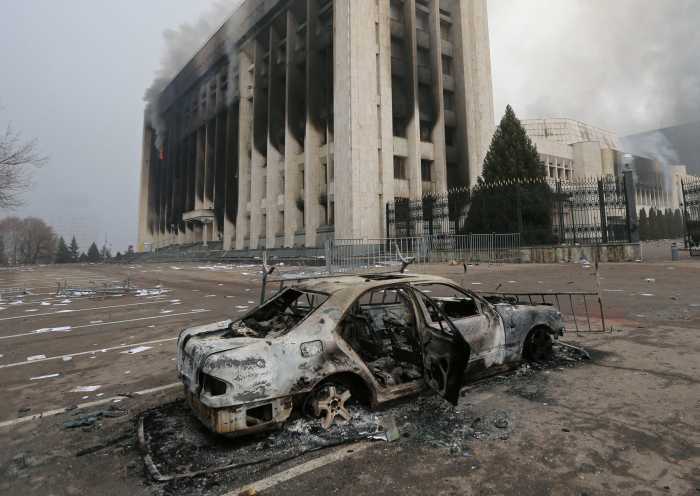By Vitalii Hnidyi and Pavel Polityuk
TROSTYANETS/LVIV, Ukraine – Ukrainian forces are preparing for new Russian attacks in the southeast, where Moscow’s guns are now trained after its assault on the capital Kyiv was repelled, President Volodymyr Zelenskiy said on Thursday.
Five weeks into an invasion that has blasted cities into wastelands and created more than 4 million refugees, U.S. and European officials said Russian president Vladimir Putin was misled by his generals about the dire performance of Russia’s military.
The International Committee of the Red Cross (ICRC) said it was bringing a convoy of aid to reach the besieged Black Sea port of Mariupol, where tens of thousands of people have been trapped for weeks under bombardment without food, water or heat.
In an early morning video address, Zelenskiy said Russian troop movements away from Kyiv and the northern city of Chernihiv were “the consequence of our defenders’ work.”
But Ukraine was seeing “a build-up of Russian forces for new strikes on the Donbas and we are preparing for that,” he said, referring to the southeastern region Russia demands Ukraine cede to separatists, where Mariupol is the main port.
Tough resistance by Ukrainian forces has so far prevented Russia from capturing any major city, including Kyiv, which it assaulted with armored columns from the northwest and east.
Moscow says it is scaling back its offensives near the capital and the north and now focusing on “liberating” Donbas.
Mariupol, once a city of 400,000 people, has been destroyed by four weeks of relentless bombardment and siege. The United Nations believes thousands of people have died there.
Previous attempts to bring aid into besieged parts of the city have failed and civilians have only been able to escape if they have cars. Ukraine said 45 buses were on their way on Thursday and the ICRC said it would evacuate civilians from Friday if the warring parties agreed on safe passage.
“It’s desperately important that this operation takes place. The lives of tens of thousands of people in Mariupol depend on it,” said ICRC spokesperson Ewan Watson in Geneva.
In a part of Mariupol now held by Russia, people climbed out of cellars to appear, ghostlike, among the ruins. A man named Pavel placed a bowl and spoon as a tribute on a makeshift grave in a patch of grass, marked with a plain wooden cross.
“Our friend. March 16. Driving in a car. A bullet hit him in the throat. He was dead in five minutes,” he said.
PUTIN MISLED, U.S. SAYS
The past week has seen a Ukrainian counter-offensive, recapturing destroyed suburbs of Kyiv and strategic towns and villages in the northeast and southwest.
Moscow calls its decision to pull back near the capital a goodwill gesture for peace talks. Kyiv and its allies say that is an excuse to try to regroup following its losses.
Evidence of Ukraine’s successful counterattack could be seen in Trostyanets, now in Ukrainian hands after being recaptured this week. The town in eastern Ukraine controls a road leading out of Sumy, a major city which had been under siege.
Burnt-out Russian tanks and abandoned ammunition littered the wreckage of the town. Dazed civilians and a few Ukrainian soldiers roamed the muddy streets.
“We spent 30 days in the basement, with small children. The children are shaking, even still. They ask: ‘When will we go to kindergarten? When will we go to school?’ They don’t understand what has happened,” said a woman named Larisa.
Vadym Shashkov, 60, gestured beside a wrecked hospital where he had helped rescue survivors from Russian shelling.
“There were women who had given birth to their children, there were babies here, including twins. We pulled people out of the hospital. Thank God, we got them all.”
Russia says it launched a “special military operation” to disarm and “denazify” its neighbor, and that the mission is going to plan.
Western countries say the invasion was an unprovoked war of aggression, that Russia’s true aim was to swiftly topple the government in Kyiv, and that its failure has been a strategic catastrophe, bringing economic ruin and diplomatic isolation.
U.S. officials have declassified intelligence which they said showed a rift between Putin and top advisors who failed to warn him of the poor performance of his military or the economic impact of Western sanctions.
“We have information that Putin felt misled by the Russian military, which has resulted in persistent tension between Putin and his military leadership,” Kate Bedingfield, White House communications director, told reporters on Wednesday. Putin was being misinformed about the campaign “because his senior advisors are too afraid to tell him the truth,” she said.
Western sanctions imposed on Russia as punishment for its invasion have largely isolated its economy from world trade, but Moscow is still the biggest supplier of oil and gas to Europe.
The United States is considering releasing up to 180 million barrels of oil over several months from its Strategic Petroleum Reserves (SPR) to ease prices, two U.S. sources said. Oil prices fell more than $5 a barrel on Thursday on the news.
Russia has demanded Europe pay for its gas in roubles by Friday, raising fears of energy shortages. Germany has warned of a possible emergency if Russia cuts supplies.
A German government spokesperson said Putin had told Chancellor Olaf Scholz on Wednesday that payments could still be made in euros to Gazprombank, a bank affiliated with the Russian gas export monopoly, which would convert the money to roubles.
However, the Russian business newspaper Kommersant said Gazprom was looking into shutting off supplies: “Gazprom … is indeed working on an option of a complete stoppage of gas supplies to ‘unfriendly countries’ and is evaluating the consequences of such measures,” it wrote.


































